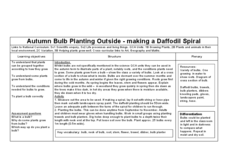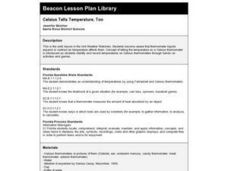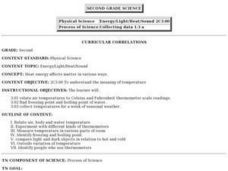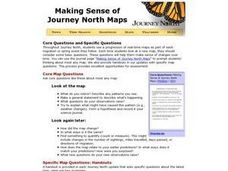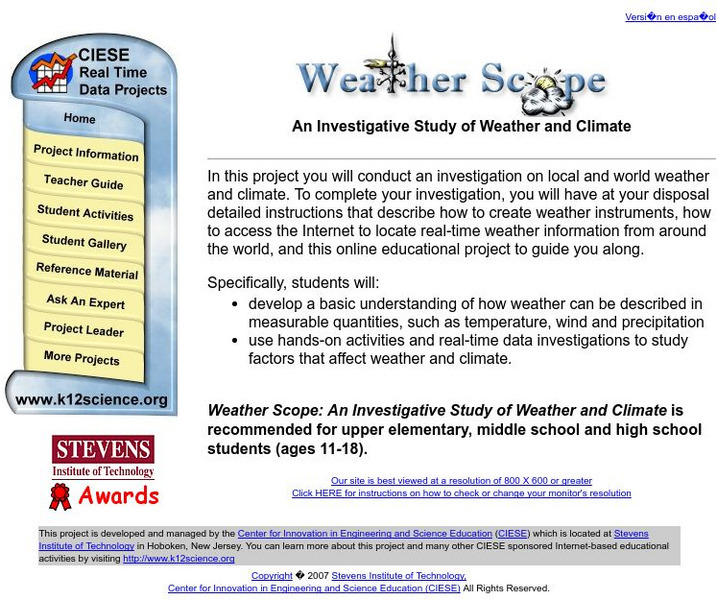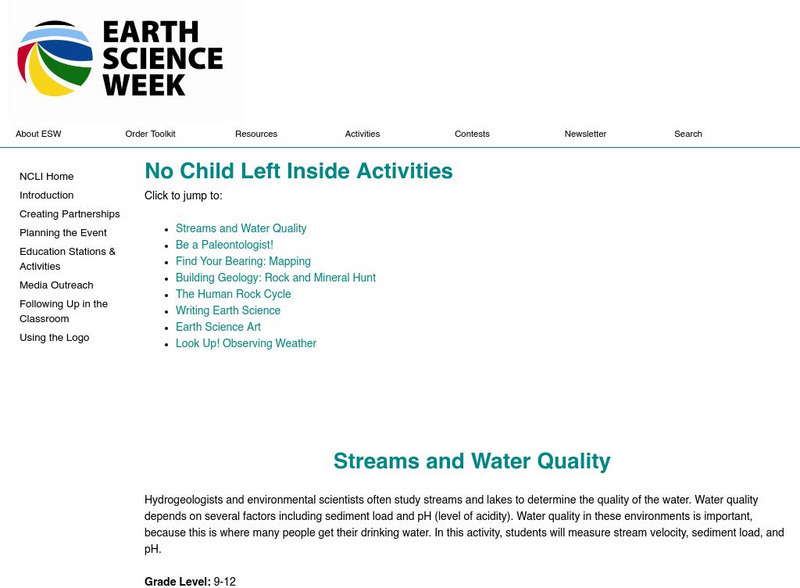Curated OER
Zoo Poo
Students use Internet research to determine the amount of carbon dioxide produced per unit energy for biomass and coal. In this alternative energy lesson, students research to find out how much energy and carbon dioxide several coal and...
Curated OER
Autumn Bulb Planting Outside - Making a Daffodil Spiral
Students plant daffodil bulbs. In this gardening activity, students work outside to plant daffodil bulbs in the autumn so that they can grow roots and emerge by spring.
Curated OER
Celsius Tells Temperature, Too
Second graders become aware that thermometer liquids expand or contract as temperature affects them.
Curated OER
Science Experiments - The Low-down
Third graders discover the process thinking about science experiments, and why they are important. They work in small groups using incline planes and a small toy car to design one scientific question that can be answered through...
Curated OER
Observing Fall Migrants
Pupils observe the migration of monarch butterflies. They collect data regarding the number of monarchs they see, the location, the butterflies' behavior, the temperature and the date and time. Then they send their data to a university...
Curated OER
Math is Beautiful
Students explore how geometry is used on the composition of artworks by artists from different cultures. This lesson is equally suited for a Math or Art classroom at the late-elementary or early-middle school level.
Curated OER
Ocean Botttom Profile
Students interpret a graph of ocean depths and topographic features. This task assesses students' abilities to interpret figures, organize and represent data, apply knowledge of scale to a profile, and apply theoretical knowledge.
Curated OER
Heat Energy- Temperature
Second graders investigate the meaning of temperature. They determine what happens to a thermometer when the temperature rises or falls. They place thermometers in different classroom locations in order to compare the temperature in a...
Curated OER
Tropical Atlantic Aerosols
Students analyze NASA data from the Multi-angle Imaging Spectroradiometer. In this NASA data lesson, students access an assigned website to examine information from the MISR on the Terra Satellite. They determine how desert dust travels...
Curated OER
The Beaufort Scale: A Local Model
Students study the Beaufort Scale and use it to study wind in their community. In this wind study lesson, students watch a DVD about climate change and learn about the Beaufort Scale. Students complete a worksheet for the topic.
Curated OER
Twister Redux
Students pick up science knowledge as they track and examine natural disasters. They keep a daily journal of results and reflections. Students get to follow a real tornado chaser and learn thunderstorm formation. They incorporate how...
Curated OER
Manage Soil
Young scholars identify and classify soil ypes according to data on the soil triangle. Given examples, students identify soil conservation practices, using criterion assessment instrument. When giving a case situation involving soil...
Curated OER
Air Pressure
Fourth graders observe a demonstration experiment showing air pressure. They explain air pressure by completing the worksheet.
Curated OER
Global Warming Part 4: The Science Behind the Climate Change Story: Ozone
Students consider various scientific research in order to arrive at their own conclusions as to whether global warming is occurring and if it constitutes a problem.
Curated OER
Making Sense of Journey North Maps
Young scholars use maps and answer core curriculum questions in order to increase comprehension and practice higher order thinking skills. This helps them develop writing skills through the practice of keeping Science Journals.
Center for Innovation in Engineering and Science Education, Stevens Institute of Technology
Ciese Real Time Data Projects: Weather Scope: A Study of Weather and Climate
Use real-time data to study factors that affect weather and climate, create weather instruments, and share data with students around the world.
American Geosciences Institute
American Geosciences Institute: Earth Science Week: Look Up! Observing Weather
To get a better idea of how meteorologists make weather predictions, students will begin their own weather journals and make rain gauges.

